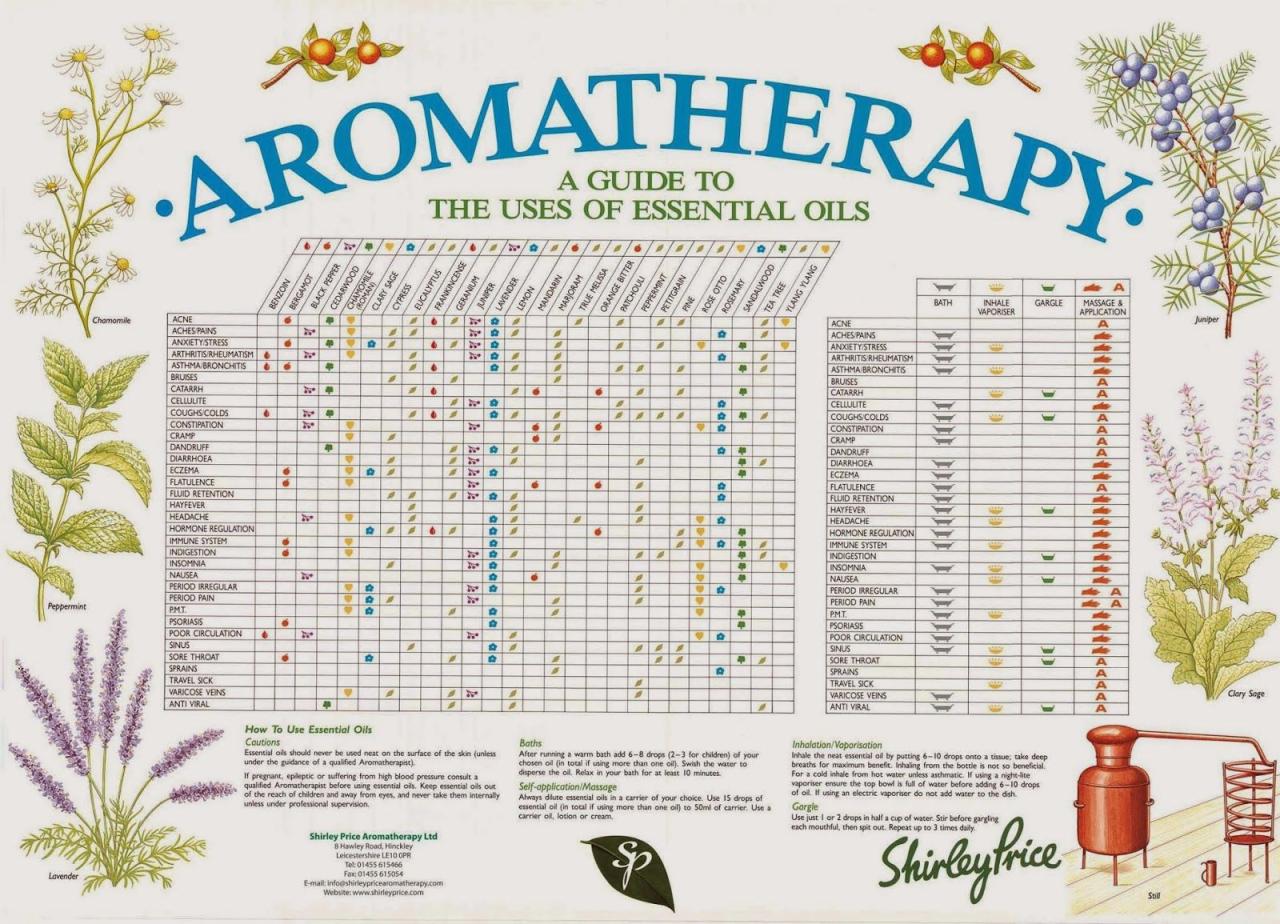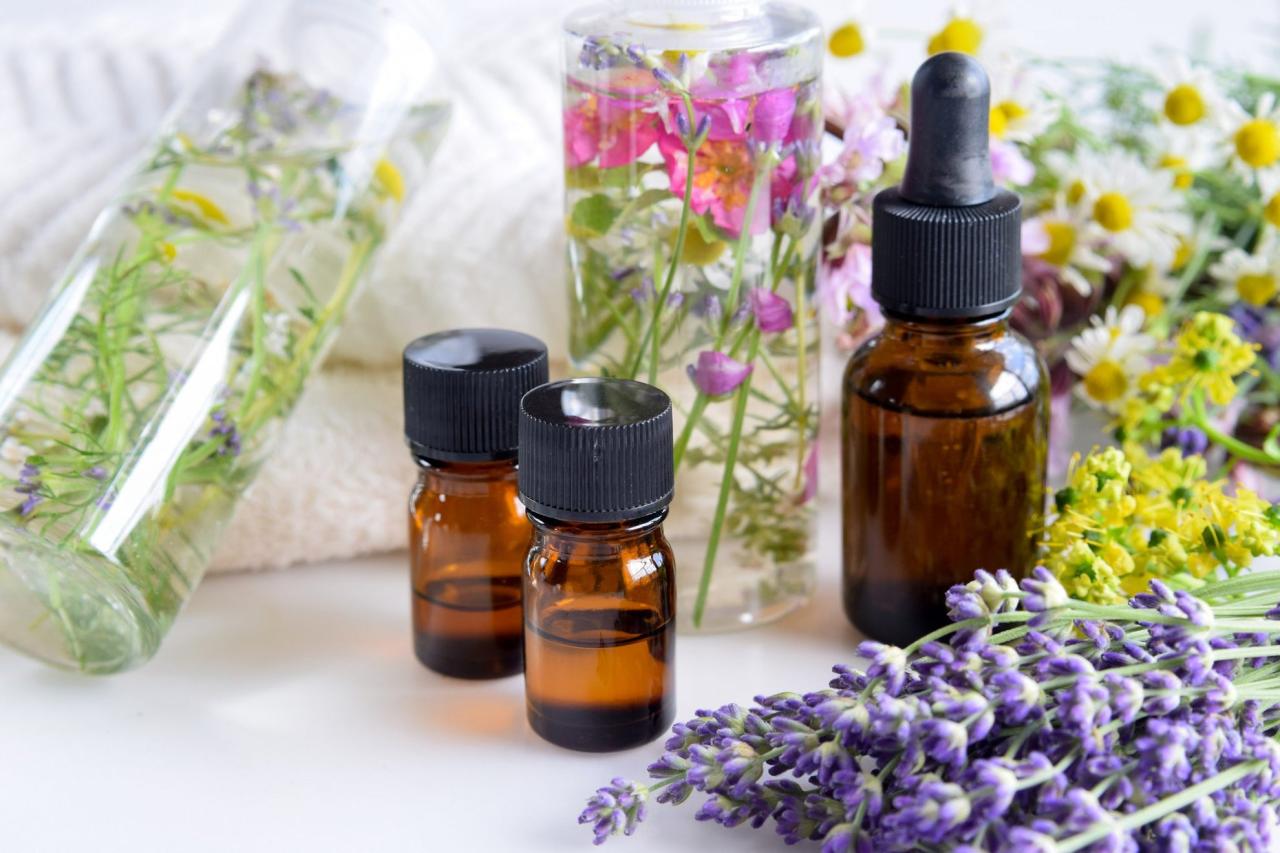Welcome to the world of aromatherapy, where scents transform into therapeutic experiences. From ancient practices to modern applications, aromatherapy has stood the test of time, offering a holistic approach to well-being. Dive into our comprehensive aromatherapy list, where we unveil the secrets of essential oils and their remarkable therapeutic properties.
In this guide, we’ll explore the captivating history of aromatherapy, unravel the science behind essential oils, and provide practical tips for incorporating these fragrant wonders into your daily routine. Whether you’re seeking relaxation, stress relief, or a natural remedy for common ailments, our aromatherapy list will empower you with the knowledge to harness the power of nature’s scents.
Aromatherapy Basics
Aromatherapy is the practice of using essential oils, which are concentrated plant oils, for therapeutic purposes. It has been used for centuries in various cultures, dating back to ancient Egypt, Greece, and China.
Essential oils are extracted from plants through various methods such as distillation, cold pressing, and solvent extraction. They contain volatile compounds that give plants their characteristic scents and therapeutic properties.
Types of Essential Oils
There are hundreds of different essential oils available, each with its own unique properties. Some of the most popular essential oils include:
- Lavender: Relaxation, sleep, pain relief
- Peppermint: Energy boost, headache relief, nausea relief
- Tea Tree: Antiseptic, antibacterial, antifungal
- Eucalyptus: Decongestant, respiratory support, pain relief
- Lemon: Mood boost, cleaning, air purification
Aromatherapy Applications
Aromatherapy finds diverse applications in promoting relaxation, reducing stress, and enhancing sleep quality. It can be incorporated into various practices, including massage, baths, and diffusers, and can be seamlessly integrated into daily routines for optimal well-being.
Relaxation and Stress Relief
- Lavender:Renowned for its calming effects, lavender oil promotes relaxation and reduces anxiety. It can be used in baths, diffused in the air, or applied topically.
- Chamomile:Possessing soothing properties, chamomile oil calms the mind and body, alleviating stress and promoting relaxation.
- Bergamot:Uplifting and mood-boosting, bergamot oil helps reduce stress and create a sense of tranquility.
Sleep Improvement
- Valerian root:Known for its sedative effects, valerian root oil promotes relaxation and improves sleep quality.
- Vetiver:Grounding and calming, vetiver oil helps reduce anxiety and promotes restful sleep.
- Ylang-ylang:Relaxing and balancing, ylang-ylang oil creates a soothing atmosphere, aiding in sleep.
Massage
Aromatherapy oils can be incorporated into massage therapy to enhance relaxation and stress relief. By diluting the oils in a carrier oil, such as jojoba or almond oil, they can be applied topically during a massage.
Baths
Adding aromatherapy oils to a warm bath can create a relaxing and therapeutic experience. By dispersing the oils in the water, they release their aromas and provide benefits through inhalation and skin absorption.
Diffusers
Diffusers disperse essential oils into the air, creating an aromatic environment that can promote relaxation, reduce stress, and improve sleep. They can be used in homes, offices, or any desired space.
Daily Routine
- Morning:Use invigorating oils like peppermint or citrus to boost energy and focus.
- Afternoon:Opt for calming oils like lavender or chamomile to reduce stress and promote relaxation.
- Evening:Use soothing oils like valerian root or vetiver to prepare for sleep.
Essential Oils for Specific Conditions
Essential oils possess therapeutic properties that can alleviate a wide range of ailments. Understanding their specific benefits enables us to harness their potential effectively.
Headaches
Inhaling essential oils like peppermint, lavender, or rosemary can provide immediate relief from headaches. Peppermint’s cooling effect constricts blood vessels, reducing inflammation. Lavender’s calming properties relax tense muscles, while rosemary improves circulation, alleviating pressure.
Anxiety
Essential oils like chamomile, bergamot, and ylang-ylang promote relaxation and reduce anxiety levels. Chamomile’s sedative effects calm the nervous system, while bergamot’s uplifting aroma eases tension. Ylang-ylang’s soothing properties balance emotions.
Insomnia
Essential oils like lavender, valerian root, and vetiver can induce sleep and improve sleep quality. Lavender’s calming properties promote relaxation, while valerian root reduces anxiety and restlessness. Vetiver’s grounding aroma creates a sense of tranquility, facilitating restful sleep.
Blending Essential Oils
Combining essential oils can enhance their therapeutic effects. For example, blending lavender and peppermint for headaches provides both calming and pain-relieving benefits. Mixing chamomile and bergamot for anxiety promotes relaxation and reduces stress. Combining lavender and valerian root for insomnia induces sleep and improves sleep quality.
| Essential Oil | Therapeutic Properties |
|---|---|
| Peppermint | Cooling, pain-relieving, headache relief |
| Lavender | Calming, relaxing, sleep-inducing |
| Rosemary | Stimulating, circulation-improving, headache relief |
| Chamomile | Sedative, anxiety-reducing, sleep-inducing |
| Bergamot | Uplifting, tension-relieving, anxiety-reducing |
| Ylang-Ylang | Soothing, emotion-balancing, anxiety-reducing |
| Valerian Root | Anxiety-reducing, sleep-inducing, restlessness-reducing |
| Vetiver | Grounding, tranquilizing, sleep-promoting |
Aromatherapy Safety and Precautions

While aromatherapy offers numerous benefits, it’s crucial to be aware of potential risks and precautions. Essential oils are highly concentrated plant extracts, and improper use can lead to adverse effects. This section will discuss safety considerations, dilution guidelines, and specific precautions for using aromatherapy with children, pets, and during pregnancy.
Potential Risks and Side Effects
Essential oils can cause skin irritation, allergic reactions, or respiratory issues if not used properly. Some oils, such as tea tree oil and wintergreen, can be toxic if ingested. Pregnant women should avoid certain oils, such as rosemary and clary sage, as they may induce contractions.
Dilution and Application
To ensure safe use, essential oils must be diluted before applying them to the skin. Common carrier oils used for dilution include coconut oil, jojoba oil, or sweet almond oil. The recommended dilution ratio for topical application is 2-3 drops of essential oil per 10 ml of carrier oil.
Aromatherapy for Children, Pets, and Pregnancy
Special precautions are necessary when using aromatherapy with children, pets, and pregnant women.
Children
Children’s skin is more sensitive than adults’, so it’s crucial to use lower dilution ratios (1 drop of essential oil per 30 ml of carrier oil). Avoid using strong oils like eucalyptus or peppermint, which can cause respiratory distress.
Pets
Certain essential oils, such as tea tree oil and citrus oils, can be toxic to pets. Consult a veterinarian before using aromatherapy around animals.
Pregnancy
Pregnant women should avoid certain essential oils, such as rosemary, clary sage, and juniper berry, as they may cause uterine contractions. It’s always advisable to consult a healthcare professional before using aromatherapy during pregnancy.
Aromatherapy Research and Evidence

A growing body of scientific research supports the benefits of aromatherapy for various health concerns. Studies have demonstrated its effectiveness in reducing stress, improving sleep, and alleviating pain and inflammation.
However, it is important to note that aromatherapy research is still in its early stages, and more studies are needed to fully understand its potential benefits and limitations.
Promising Findings
- A study published in the journal “Complementary Therapies in Medicine” found that inhaling lavender essential oil reduced anxiety and improved sleep quality in postpartum women.
- Another study in the “Journal of Pain and Symptom Management” showed that aromatherapy with peppermint oil significantly reduced pain intensity in patients with osteoarthritis.
- A review of studies published in the “International Journal of Nursing Studies” concluded that aromatherapy can effectively reduce stress and improve well-being in healthcare professionals.
Limitations and Gaps
- Many aromatherapy studies are small-scale and have methodological limitations, making it difficult to draw definitive conclusions.
- The optimal dosage, duration, and method of aromatherapy for specific conditions are still being investigated.
- More research is needed to determine the long-term effects and potential risks of aromatherapy, especially for specific populations such as pregnant women and children.
It is crucial to consult with a qualified healthcare professional before using aromatherapy for any specific health concern. They can provide personalized guidance and ensure that aromatherapy is used safely and effectively as part of a comprehensive treatment plan.
Epilogue

As we conclude our aromatherapy journey, we hope you’ve gained a newfound appreciation for the transformative power of essential oils. Remember, aromatherapy is not merely a passing trend but an ancient practice with a wealth of scientific backing. Embrace the scents of nature, incorporate them into your daily life, and experience the profound impact they can have on your well-being.
May this aromatherapy list serve as your trusted companion, guiding you towards a life filled with fragrance, harmony, and vitality.